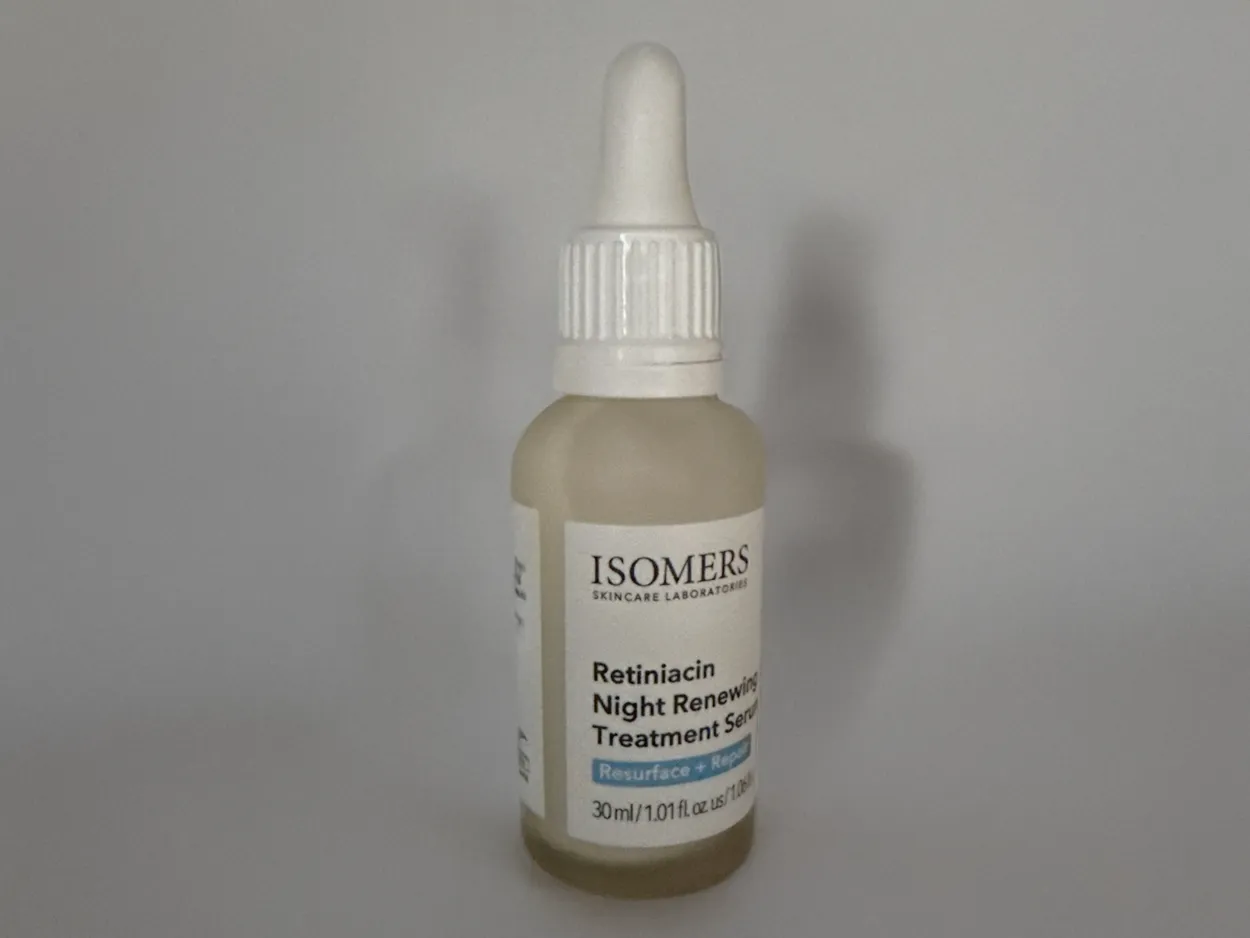Isomers may not have the same mainstream recognition as some legacy beauty houses, yet within skincare circles its science first approach enjoys a low key cult following. The Canadian brand has a reputation for marrying clinical actives with skin comforting carriers, so when they announced Retiniacin Night Renewing Treatment Serum my curiosity was piqued.
The name itself sounds like a lab experiment you might want to keep at arm’s length, but the promise is straightforward: overnight repair and revitalisation powered by the power couple niacinamide and retinol. According to Isomers the formula tackles fine lines, uneven tone, enlarged pores and dehydration while nudging skin into a healthier renewal rhythm. I spent a full two weeks putting that claim to the test, curious to see if the results would justify a spot on your bathroom shelf and your budget.
What is Retiniacin Night Renewing Treatment Serum?
This formula sits in the overnight treatment category, meaning it is designed to be applied before bed and left to work while the skin is in its natural repair mode. Overnight treatments are useful because they avoid daytime UV interference, sidestep makeup layering issues and often contain actives that can be unstable or irritating under sunlight.
Retiniacin combines two well known actives: niacinamide, a form of vitamin B3 linked to barrier support and brightness, and retinol, a vitamin A derivative used to encourage cell turnover. Alongside those, safflower oleosomes provide a slow release lipid delivery intended to keep the actives from overwhelming the skin in one hit. The brand positions the serum as a multitasker aimed at softening fine lines, refining texture, reducing the look of enlarged pores and bolstering overall radiance. Hydration is part of the brief too, so it includes triglycerides and glycerin to offset the drying potential of retinoids.
In essence you are getting a single step night product that attempts to marry renewal and hydration, making it suitable for users who prefer a shorter evening routine or who are looking to consolidate multiple actives into one application.
Did it work?
In the name of science I parked my usual overnight acid treatment for three days before starting Retiniacin so my face could host a very controlled experiment. Fourteen nights felt like a reasonable window to judge early results yet short enough to spot any irritation.
I used it as directed: one pump smoothed over still slightly damp skin followed by a basic moisturizer. The first couple of evenings were uneventful although a faint tingle around my chin hinted that the retinoids were clocking in. By night four I noticed a whisper of dryness on the sides of my nose and one rogue flake on my forehead. A heftier dollop of moisturizer fixed that and I carried on.
Week one brought subtle improvements. My skin felt a touch smoother to the fingertips and the post summer dullness seemed to lift. No fireworks but also no redness which wins points in my book.
Things picked up around day ten. Makeup sat more evenly, the little horizontal line across my brow looked slightly relaxed and a stubborn patch of congestion on my right cheek had flattened. Enlarged pores around my nose remained but maybe half a millimeter tighter if I squinted. Hydration held steady through some chilly nights so the slow release safflower claim appears to hold water.
By the end of the fortnight my verdict was clear: Retiniacin delivers on most of its promises though in a measured way. It smooths texture, adds a hint of brightness and keeps dryness at bay but the gains are incremental rather than game changing. I respect the steady performance yet I will not be bumping my current heavyweight serum for it. Still, I am happy to have met a gentler option that could suit less adventurous skin types.
Main ingredients explained
The formula hangs its hat on two powerhouse actives: 5 % niacinamide and 0.3 % retinol blended with its gentler cousins retinyl acetate and retinyl palmitate. Niacinamide acts like a multitasking project manager for the skin, encouraging stronger barrier function while nudging down blotchiness and excess oil. Retinol in turn speeds up cell turnover, which is why the serum can soften fine lines and help clear lingering congestion after a couple of weeks. Using a trio of vitamin A forms spreads out the activity so you get results without the face-peeling drama common to higher concentrations.
To cushion that activity Isomers uses safflower oleosomes. Think of them as time release lipid bubbles that leak their contents slowly while adding triglycerides to keep the skin barrier lubricated. The supporting cast then steps in: glycerin and propylene glycol pull water into the epidermis, tocopherol delivers antioxidative backup, sodium ascorbate gives a low intensity vitamin C boost and hydroxyacetophenone acts as a soothing preservative helper. There is also sh-oligopeptide-1, a growth factor peptide that signals skin to behave a bit more youthfully, though its benefits tend to show up with longer use than my two-week sprint allowed.
Most of the ingredients are plant or lab derived which makes the formula suitable for vegans and vegetarians. Nothing here is outright pore clogging although caprylic/capric triglyceride and retinyl palmitate sit around a 2 on the comedogenic scale. That means they could contribute to breakouts in people who are highly prone to clogged pores but are generally safe for the average skin type. “Comedogenic” simply refers to an ingredient’s tendency to create comedones, the technical term for blackheads and whiteheads.
A quick safety note: retinoids are off the recommended list for pregnancy or breastfeeding. If you are expecting, trying or nursing, park this serum until your doctor gives the green light. The blend also contains sandalwood oil so patch test if you are sensitive to essential oils.
Finally the water free of drying alcohols and absence of added fragrance (beyond the tiny amount of natural sandalwood) make this an unusually balanced night treatment for something that leans on retinol. Experienced users may crave a punchier percentage yet beginners or anyone with reactive tendencies will appreciate the thoughtful ingredient synergy.
What I liked/didn’t like
Here is the straightforward rundown after two weeks of nightly use.
What works well:
- Gentle retinol blend delivers steady smoothing without noticeable irritation
- Safflower oleosomes keep hydration levels stable so skin feels cushioned come morning
- Visible uptick in overall brightness and makeup glide by week two
What to consider:
- Results arrive gradually so impatient users may crave faster payoff
- Those already on higher strength retinoids might find the 0.3 percent ceiling underwhelming
- Mid tier price positions it above basic retinol creams yet performance is more incremental than transformative
My final thoughts
After a solid two-week tour on my nightstand I am landing at a respectable 7/10 for Isomers Retiniacin Night Renewing Treatment Serum. It earns that score for being consistent, comfortable and genuinely smoothing without tipping my skin into the retinol red zone. If you are retinoid-curious yet wary of the typical dryness or flaking this is an approachable entry point that still sprinkles in enough niacinamide to help with tone and resilience.
Who will enjoy it most? Anyone with combination to normal skin looking for gradual refinement and a simplified bedtime routine. Reactive types who wince at stronger retinoids should also take note. Who might shrug? Seasoned vitamin A enthusiasts chasing dramatic wrinkle softening or pore shrinkage will likely wish for more octane, and bargain hunters may feel the results do not fully justify the mid tier spend.
Would I recommend it to a friend? Yes, with caveats. I would steer a beginner or someone prone to irritation straight toward it, while my more hardcore skincare buddies would get a nudge toward something beefier.
If you try it and decide you want a different overnight vibe, a few alternatives I have personally rotated through might hit the spot. Deascal’s Nocturnal Revive Cream is an excellent covers-all-bases hydrator that plays nicely with every skin type and costs a little less per ounce. Dermedic’s Hydrain Night Cream is a featherlight water magnet for parched complexions that cannot tolerate retinol at all. For a more advanced active mix Medik8 Advanced Night Restore pairs encapsulated vitamin A with ceramides and antioxidants in a richer texture. Finally ELEMIS Superfood Midnight Facial delivers a probiotic-leaning cocktail that boosts glow while keeping the barrier calm, perfect for those nights when you fancy a break from retinoids entirely.
Before you slather anything new on your face please remember the basics: patch test along the jawline, give your skin a couple of weeks to acclimate and do not expect permanent miracles unless you keep the routine going (sorry for sounding like an over-protective parent!). Consistency outweighs any single bottle so choose the formula that you will actually enjoy using night after night.

